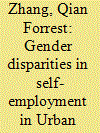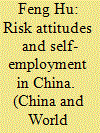|
|
|
Sort Order |
|
|
|
Items / Page
|
|
|
|
|
|
|
| Srl | Item |
| 1 |
ID:
124651


|
|
|
|
|
| Publication |
2013.
|
| Summary/Abstract |
This article presents the first quantitative analysis of gender disparities in self-employment in urban China. It documents the extent of gender income inequality in self-employment. By disaggregating self-employment into three occupational classes, it reveals the gender segregation within self-employment - women were concentrated in the financially least rewarding segment - and identifies it as a main source of gender income inequality. I examine a range of determinants of participation in self-employment, including family structure, family background and career history, and how their gender-specific effects contribute to gender segregation. Although using data from a 1996 national survey, this study captures two key processes that shaped the structure of self-employment in contemporary urban China: the restructuring of the state sector and the growth of financial returns and social status in the private sector, both of which contributed to the formation of gender segregation in self-employment.
|
|
|
|
|
|
|
|
|
|
|
|
|
|
|
|
| 2 |
ID:
102250


|
|
|
|
|
| Publication |
2010.
|
| Summary/Abstract |
After two decades of rural-to-urban labour exodus, an increasing trend of urban-to-rural labour counterflow has also occurred in China*. This paper discusses the economic performance of return migrants with data from a survey conducted in Wuwei County in 2008. We identify the characteristics of return migrants, record their occupational change patterns, and examine their current self-employment activities. A comparative approach with non-migrants is used throughout the paper.
|
|
|
|
|
|
|
|
|
|
|
|
|
|
|
|
| 3 |
ID:
110503


|
|
|
|
|
| Publication |
2011.
|
| Summary/Abstract |
When examining questions regarding the Lewis model, one of the most salient set of facts involves the shift of labor between agricultural and the off farm sectors. The goal of this paper is to answer several questions about the nature of this movement: How has the expansion of the economy after 2000 affected off farm labor market participation? Has off farm labor continued to rise? What is this rise being driven by-migrant wage earners or self employment opportunities? What is, in part, driving these trends? Using a national representative set of data that consists of two waves of surveys done in 2000 and 2008 in six provinces, the paper finds that off farm labor market participation has continued to rise steadily in the early 2000s. However, there has been a structural break in the trends of occupational choice before and after 2000. Unlike before 2000, after 2000 migration's growth accelerated; during this same period the self employed subsector stagnated. The number of wage earning migrants in 2008 was greater than the number of those in the self employed subsector. The data also show that the rise in wage-earning migration is mainly being driven by the younger cohorts. Our analysis also shows that the rise of migration is happening in conjunction with a rising unskilled wage.
|
|
|
|
|
|
|
|
|
|
|
|
|
|
|
|
| 4 |
ID:
131402


|
|
|
|
|
| Publication |
2014.
|
| Summary/Abstract |
Using the 2006 wave of the Chinese General Social Survey, the present paper examines the effect of risk attitudes on the likelihood of entrepreneurship in China. Our results show that risk attitudes have a nonlinear effect on the likelihood of being entrepreneurs. Risk neutral people are most likely to be entrepreneurs, while both risk averse and risk seeking people prefer to work for wages. When we further divide entrepreneurs into necessity and opportunity entrepreneurs, we find only a marginal difference in risk attitudes between wage workers and necessity entrepreneurs, while less risk averse individuals tend to be opportunity entrepreneurs. Our results have important policy implications for the government's efforts to promote entrepreneurial activities.
|
|
|
|
|
|
|
|
|
|
|
|
|
|
|
|
| 5 |
ID:
120120


|
|
|
|
|
| Publication |
2013.
|
| Summary/Abstract |
Many Colombians are confronted with the ongoing conflict that influences their decision making in everyday life, including their behavior in labor markets. This study focuses on the impact of violent conflict on self-employment, enlarging the usual determinants with a set of conflict variables. Our estimation strategy compares three different estimates: one from fixed-effects panel data (OLS-FE), estimates using lagged conflict indicators instead of contemporaneous regressors, and instrumental variables (IV-FE) estimates. Our results show that a one standard deviation increase in net displacement rates increases the rate of self-employment by about 7 percent points. Dividing the self-employed into different sectors (services and agriculture), we find that net displacement increases self-employment in the services sector but has no effect in agriculture that is affected by attacks by rebel and paramilitary groups, instead. Looking at the income of self-employed individuals, an influx of displaced reduces sharply hourly income in the self-employment sector.
|
|
|
|
|
|
|
|
|
|
|
|
|
|
|
|
| 6 |
ID:
139553


|
|
|
|
|
| Summary/Abstract |
The rise of private sector business in urban China has led to more women engaging in low-end self-employment. This study, however, reveals a more complicated story in the countryside. Drawing on in-depth interviews conducted in a Chinese village, this study finds that the women took the lead in developing sideline self-employment and were then attracted to rural wage employment in the 1980s. With the privatization of rural industries and the rise of capital-intensive self-employment in the 1990s, some women were forced into low-end self-employment, but others were attracted to high-end self-employment, forging individual careers and family ventures. In more recent times, younger women have been more inclined to work on-and-off, balancing self-employment pursuits with the desire to be a good mother. This pattern marks a shift from the continuous multitasking practised by the older generation.
|
|
|
|
|
|
|
|
|
|
|
|
|
|
|
|
|
|
|
|
|